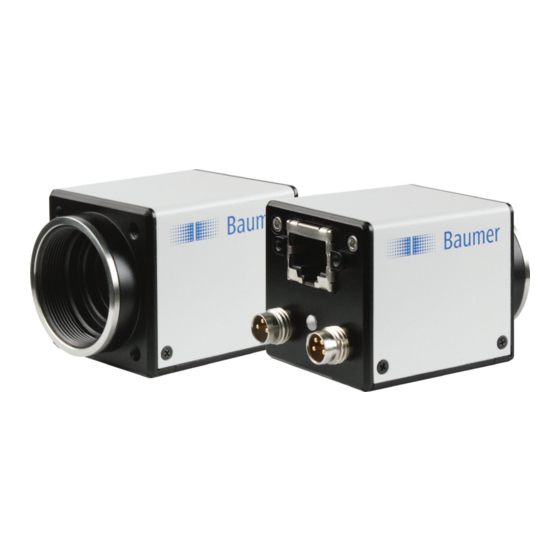Baumer EXG50 Manual do utilizador - Página 35
Procurar online ou descarregar pdf Manual do utilizador para Câmara digital Baumer EXG50. Baumer EXG50 42 páginas. Gigabit ethernet
Também para Baumer EXG50: Manual do utilizador (42 páginas)

6. Start-Stop-Behaviour
6.1.
Start / Stop
Acquisition (Camera)
Once the image acquisition is started, three steps are processed within the camera:
▪
Determination of the current set of image parameters
▪ Exposure of the sensor
▪
Readout of the sensor.
Afterwards a repetition of this process takes place until the camera is stopped.
Stopping the acquisition means that the process mentioned above is aborted. If the stop
signal occurs within a readout, the current readout will be finished before stopping the
camera. If the stop signal arrives within an exposure, this will be aborted.
Special Case: Asynchronous Reset
The asynchronous reset represents a special case of stopping the current acquisition.
Thereby exposure is aborted immediately. Thus the current image is not read out and the
image is upcasted.
This feature was introduced to accelerate the changing of image parameters.
6.2.
Start / Stop
Interface
Without starting the interface, transmission of image data from the camera to the PC
will not proceed. If the image acquisition is started befor the interface is activated, the
recorded images are lost.
If the interface is stopped during a transmission, this is aborted immediately.
6.3.
Pause / Resume
Pausing while the interface is operational, results in an interim storage of the recorded
images within the internal buffer of the camera.
After resuming the interface, the buffered image data will be transferred to the PC.
6.4. Acquisition Modes
In general, three acquisition modes are available for the cameras in the Baumer EXG
series�
6.4.1.
Free Running
Free running means the camera records images continuously without external events.
6.4.2. Trigger
The basic idea behind the trigger mode is the synchronization of cameras with machine
cycles. Trigger mode means that image recording is not continuous, but triggered by
external events.
This feature is described in chapter 4.6. Process Interface.
Interface
Asynchronous Reset:
For further information on
the timings of this feature,
please see the respective
data sheets.
35
